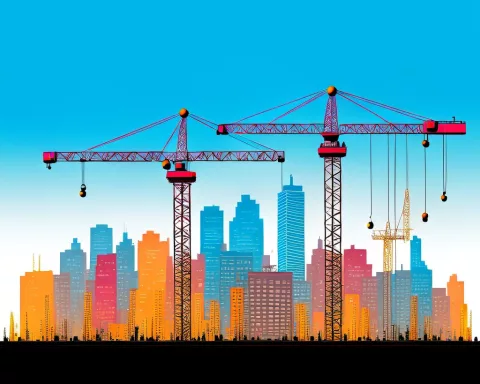The construction mafia has caused significant disruptions to Cape Town’s infrastructure development projects, including the MyCiTi bus service expansion project worth R400 million, which has been stalled since February 28th. The mafia’s practices of intimidation and violence have resulted in project delays and even stopping them altogether. However, South African law enforcement has launched a crackdown, detaining and sentencing individuals associated with the mafia to prevent further damage to the city. Despite the challenges, the authorities’ commitment to creating a safer environment for infrastructure development brings hope for Cape Town’s future.
How does the construction mafia affect Cape Town’s infrastructure progress?
The construction mafia has infiltrated Cape Town’s construction sector, causing disruptions and delays to infrastructure development projects. The MyCiTi bus service expansion project, worth R400 million, has been stalled since February 28th due to the mafia’s influence. The mafia’s practices, characterized by intimidation and violence, have resulted in project delays and even stopping them altogether. However, South African law enforcement has launched a crackdown, detaining and sentencing individuals associated with the mafia.
In the culturally vibrant city of Cape Town, known for its breathtaking landscapes and diverse cultural atmosphere, a new menace has been unleashed—an underground network of construction mafia. This felonious faction has wormed its way into the city’s construction sector, causing significant disruption to its infrastructure development. A glaring example of this intrusion is the stalling of the A Z Berman Drive widening project, a venture worth R400 million, planned for the extension of the MyCiTi bus service.
The MyCiTi Bus Service Expansion Project: A Victim of the Construction Mafia
The road expansion project, initiated under the City of Cape Town’s supervision, was conceived to improve public transportation in Mitchells Plain. The MyCiTi bus services were designed as a crucial resource for low-income households, offering dependable and reasonably priced transport for employment, educational, and other purposes. However, the project has been dormant since February 28th, demonstrating the profound influence of the construction mafia.
On the ground, the construction sites tell a tale of turmoil and menace. Rob Quintas, the Mayoral Committee Member of Urban Mobility, depicted the distressing state of affairs. He described how contractors have been compelled to vacate their work sites due to persistent disruptions and threats from a local development forum and its associates. The reign of terror imposed by the construction mafia has resulted in a halt in the region’s development undertakings.
From Past to Present: The Unfolding Saga of Construction Mafia
But the construction mafia’s activities are far from new. Originating in KwaZulu-Natal a decade ago, these illegal networks have slowly creeped into other parts of the country. Their practices, typically characterized by intimidation, violence, and disturbances, have led to heavy losses in terms of both human lives and economic wealth. The Daily Maverick further highlights their widespread reach, emphasizing the nationwide devastation inflicted by these criminal groups.
The presence of the construction mafia in Cape Town is indeed a grim reality. Between January 2023 and February 2024, TopAuto recorded 96 instances of extortion attempts targeting ongoing construction projects. This forceful manipulation has led to numerous project delays, with some stopping altogether. In extreme situations, the city has had to provide safe houses for its municipal workers, a testament to the perilous conditions these individuals confront daily.
Official Response: Authorities Crackdown on Construction Mafia
In retaliation to this growing threat, South African law enforcement has launched an extensive crackdown. Police Minister Bheki Cele disclosed that from April 2023 to the present, more than 61 individuals associated with the construction mafia have been detained. Since these arrests, 27 individuals have been found guilty and are cumulatively serving a total of 43 years in prison.
Undeniably, the construction mafia’s disruptive behavior has cast a dark shadow over Cape Town’s construction sector. The infrastructure development of the city, a key driver for socio-economic growth, is being hindered. Nonetheless, the authorities’ proactive efforts in tackling this issue bring hope, reflecting their unwavering commitment to creating a safer environment for infrastructure development.
The Road Ahead: Cape Town’s Battle Against the Construction Mafia
The ongoing struggle with the construction mafia stands as a grim reminder of the hurdles facing urban centers like Cape Town. As the city wrestles with this menace, its endurance is truly being questioned. This conflict embodies the intricate interplay of urban expansion and security, a story that is continually unfolding in the face of adversity.
- What is the construction mafia?
The construction mafia is an illegal network that has infiltrated Cape Town’s construction sector, causing significant disruption to its infrastructure development. Their practices are typically characterized by intimidation, violence, and disturbances.
- How has the construction mafia affected the MyCiTi bus service expansion project?
The MyCiTi bus service expansion project, worth R400 million, has been stalled since February 28th due to the mafia’s influence. The mafia’s practices, characterized by intimidation and violence, have resulted in project delays and even stopping them altogether.
- How has South Africa responded to the construction mafia threat?
South African law enforcement has launched an extensive crackdown on the construction mafia. Police Minister Bheki Cele disclosed that from April 2023 to the present, more than 61 individuals associated with the construction mafia have been detained. Since these arrests, 27 individuals have been found guilty and are cumulatively serving a total of 43 years in prison.
- What is the impact of the construction mafia on Cape Town’s development?
The construction mafia’s disruptive behavior has cast a dark shadow over Cape Town’s construction sector. The infrastructure development of the city, a key driver for socio-economic growth, is being hindered, leading to project delays and even stopping them altogether.
- How widespread is the construction mafia’s reach?
The construction mafia began in KwaZulu-Natal a decade ago and slowly crept into other parts of the country. Between January 2023 and February 2024, TopAuto recorded 96 instances of extortion attempts targeting ongoing construction projects, demonstrating their widespread reach.
- What is the future outlook for Cape Town’s battle against the construction mafia?
The ongoing struggle with the construction mafia stands as a grim reminder of the hurdles facing urban centers like Cape Town. However, the authorities’ proactive efforts in tackling this issue bring hope, reflecting their unwavering commitment to creating a safer environment for infrastructure development.












